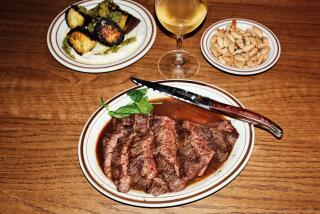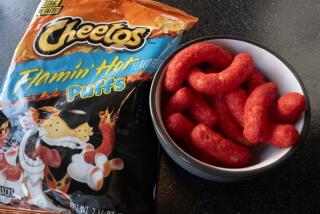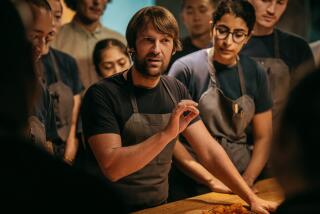Hey, This Is Great Ram
- Share via
In Dagestan, a remote part of the Soviet Union’s rugged Caucasus Mountains, the traditional meat served to honor a guest is ram--adult male goat. (There’s an ancient cult of the ram in Dagestan, and anyway it appears that ram is about all that’s available in this kid- and lamb-eating area as a special-occasion meat.) Often rams are slaughtered ahead of time and dried, making the gamey and already legendarily tough flesh into a sort of ram jerky; it’s usually boiled up for honored dropper-inners in ram noodle soup. As yet the Dagestan tourism industry remains in its infancy.
Puffer Fish Update
Everyone knows the best sashimi is said to come from the puffer fish (fugu), which contains a poison that instantly kills about 100 fugu fanciers a year in Japan. As of last year the U.S. Department of Agriculture has allowed the import of puffer fish so long as they have been certified safe by two fugu experts in Japan, guaranteed by the Japanese government and declared free of tetrodotoxin by a laboratory. Although we have been unable to find any restaurant in Los Angeles that serves fugu (a least one top sushi chef was unaware that it was legally available), seven restaurants in New York City serve it in season at $60 a plate with no health problems reported yet.
Tomorrow He Sleeps With the Puffer Fishes
Frank H. Wohl, appointed by a federal court to oversee the Fulton Fish Market two years ago, claims fish is high in New York because nearly all the seafood that reaches tables there passes through the hands of criminals. Wohl charges that because of fishy racketeering it costs as much to move a pound of fish 50 feet in the market as it did to move it hundreds of miles from New England.
It Had to Happen
Now we have New Age pop. Two companies are marketing sparkling drinks made from organically grown fruit, sweetened only with fruit juice or honey. Typically consisting of 70% juice and the rest sparkling water, they include apple and concord grape spritzers from R.W. Knudsen and lemonade and orangeade from Santa Cruz Natural; both companies also make organic raspberry lemonade. They taste pretty much like non-organic drinks (the raspberry lemonade can be rather tart), but if you insist on organic, you pay a price; they run about $1 a can.
It Had to Happen II
Now we have Performance Cuisine with a marketable product tie-in. A San Franciscan known as Johnny Ciao does a cooking show including music, magicians and comedy. His video, “Cooking With Pop Music Stars,” will benefit Scleroderma Research Foundation in San Francisco; his Vegta-Bread, sold in health food stores, includes carrots zucchini, scallions, garlic, parsley and bell peppers in whole-wheat bread.
Equal Time for Wine
Federal law requires wineries to carry a harsh warning from the Surgeon General about the ill effects of alcoholic beverages. Jordan Winery’s labels now counter it with a dignified but heartfelt reply: “Wine has been with us since the beginning of civilization. It is the temperate, civilized, sacred, romantic, mealtime beverage recommended in the Bible. Wine has been praised for centuries by statesmen, philosophers, poets and scholars. Wine in moderation is an integral part of our culture, heritage and the gracious way of life.”
Things That Shouldn’t Have Been Invented 397: Flavored Coffee
Coffee drinking is up after a six-year slump, say the statistics. But how much of it is coffee drinking? Gloria Jean, the big gourmet coffee bean chain with 70 stores around the country, names a special blend and a Colombian among its top eight best-selling coffees, but the others sound less like coffees than candies or ice creams. They have names like hazelnut, French vanilla, Irish creme, chocolate raspberry, amaretto and Swiss chocolate almond.
After insisting on expensive Arabica coffee beans because each local variety has a unique flavor, and no end of palaver about roasting, grinding and using the right kind of water, it seems strange to reduce the coffee to just the first ingredient in the label list.
Lest We Forget
This year marks the 75th anniversary of the invention, in Kansas City, of the cylindrical ice cream carton by Eugene Skinner and Wilbur Wright (not the airplane guy).
More to Read
Sign up for The Wild
We’ll help you find the best places to hike, bike and run, as well as the perfect silent spots for meditation and yoga.
You may occasionally receive promotional content from the Los Angeles Times.






